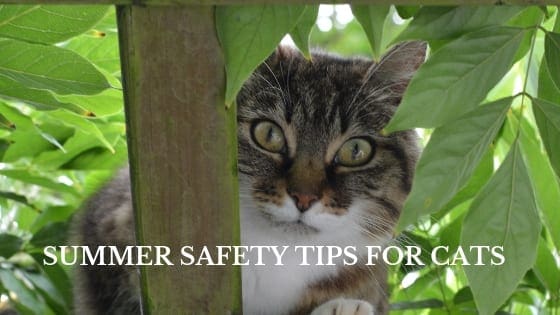
With the arrival of the warm summer weather, people spend more time outdoors, in pools, at the beach, cooking out and in general, having a good time. If you allow your cat outdoors, summer doesn’t necessarily mean good times. Heat and sun can pose a serious risk to outdoor cats. Here are some basic cat summer safety tips:
Provide Access to Water
A cat outdoors can quickly become dehydrated so make sure there is access to fresh, cool water at all times. Place water bowls in shady areas to reduce rapid evaporation and to keep the water temperature more comfortable. Frequently check water level because other outdoor animals may also be using that water source. Wash the bowl daily.
Provide Access to Shade
Don’t tether your cat on a deck or other area because she won’t be able to move to a shady spot as the sunlight shifts. Your cat needs to be able to reach shady areas. Do not limit a cat’s access to driveways or other areas that will quickly become hot. A cat’s sensitive paw pads are very vulnerable to being burned when walking across hot pavement.
Prevent Sunburn
Cats are at risk of getting sunburn. The most vulnerable areas are the tips of the ears. If you must allow your cat outdoors during summer, limit the amount of time she spends out there and as mentioned above, be sure she has access to adequate shade.
Don’t Leave Your Cat in the Car
In just a few short moments the temperature inside a locked car can skyrocket. During warm weather, the number of heat-related deaths of animals (and tragically, children) left in hot cars is staggering. Never leave your cat in the car no matter how briefly you think you’ll be gone. Even a car parked in the shade can turn into an oven in a very short amount of time. Heatstroke is also a risk for cats who are confined to carriers in a hot environment.
Provide Parasite Prevention
Cats who go outdoors are at risk of flea and tick infestation. Visit your veterinarian for advice on which flea/tick preventive is appropriate for your cat and get her started on it BEFORE letting her outdoors. Feline heartworm is also a risk so talk to your veterinarian about prescription preventive.
Beware of Stinging Insects
Kitty may think it’s a game to pounce on a yellow jacket or wasp but it won’t have a good outcome. Watch for stinging insects and be aware of nearby nests. Additionally, don’t leave food or drinks around that contain sugar because they attract bees.
Poison Protection
If you use lawn insecticides, mole poison, rodent poisons, etc., keep in mind that your cat may come in contact with them. Read labels before purchasing lawn care products to make sure they are safe for cats. Follow instructions carefully because products will state how long after application it will be safe for pets to come in contact with the lawn again.
Outdoor Eating
When grilling and entertaining outdoors, keep in mind that many of those foods are not appropriate for consumption by your cat. Provide a trash can nearby for guests to empty their leftover food so kitty can’t gain access. And speaking of eating, if you feed your cat outdoors, keep in mind that food will spoil more rapidly in the heat. It’s also more susceptible to contamination from insects.
Monitor the Cat’s Indoor Environment
If you live in a home or apartment without air conditioning, your cat may be at risk of heatstroke if the temperature soars. Ensure proper air circulation by using fans that are placed safely out of the cat’s reach. Ensure the water in the water bowl is kept filled and fresh. The occasional ice cube dropped in the water will not only help maintain a cooler temperature but it may encourage your cat to drink more water as she bats at it.
July 4th Safety
Fireworks are loud, dangerous and extremely stressful to most pets. Keep your cat indoors during this holiday to prevent injury and reduce her fear. For an outdoor cat, the sudden loud sounds of fireworks can be very startling and may cause her to bolt into oncoming traffic.
Use Common Sense
Chances are, if the outdoor temperature is uncomfortable for you, it’s also uncomfortable for your cat. Enjoy your summer but always keep your cat’s safety and comfort in mind. She’ll probably have a much better summer by beating the heat in an air-conditioned indoor environment.
Need More Information?
For more specific information on cat safety tips or for help with a cat behavior problem, refer to Pam’s best-selling books. Pam’s books are available at bookstores and online. We’ve included links to Amazon here on our website.
If you have a question about your cat’s behavior or health, contact your veterinarian. This article is not intended as a medical diagnosis nor is it a replacement for your cat’s regular veterinary care. This article is for general information purposes only.
 Problem Solving & Advice by Pam Johnson-Bennett Cat Behavior Expert & Best-selling Author
Problem Solving & Advice by Pam Johnson-Bennett Cat Behavior Expert & Best-selling Author





